
Backgammon is a two-player board game played with counters and dice on tables boards. It is the most widespread Western member of the large family of tables games, whose ancestors date back nearly 5,000 years to the regions of Mesopotamia and Persia. The earliest record of backgammon itself dates to 17th-century England, being descended from the 16th-century game of Irish.

The Intellivision is a home video game console released by Mattel Electronics in 1979. Development began in 1977, the same year as the launch of its main competitor, the Atari 2600. In 1984, Mattel sold its video game assets to a former Mattel Electronics executive and investors, eventually becoming INTV Corporation. Game development ran from 1978 to 1990, when the Intellivision was discontinued. From 1980 to 1983, more than 3.75 million consoles were sold. As per Intellivision Entertainment the final tally through 1990 is somewhere between 4.5 and 5 million consoles sold.
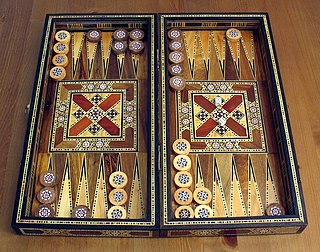
Tables games are a class of board game that includes backgammon and which are played on a tables board, typically with two rows of 12 vertical markings called points. Players roll dice to determine the movement of pieces. Tables games are among the oldest known board games, and many different varieties are played throughout the world. They are called 'tables' games because the boards consist of four quadrants or 'tables'. The vast majority are race games, the tables board representing a linear race track with start and finish points, the aim being to be first to the finish line, but the characteristic features that distinguish tables games from other race games are that they are two-player games using a large number of pieces, usually fifteen per player.
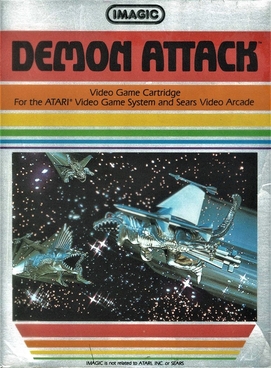
Demon Attack is a fixed shooter video game created by Rob Fulop for the Atari 2600 and published by Imagic in 1982. The game involves the player controlling a laser cannon from the surface of a planet, shooting winged demons that fly down and attack the player in different sets of patterns.

Imagic was an American video game developer and publisher that created games initially for the Atari 2600. Founded in 1981 by corporate alumni of Atari, Inc. and Mattel, its best-selling titles were Atlantis, Cosmic Ark, and Demon Attack. Imagic also released games for Intellivision, ColecoVision, Atari 8-bit computers, TI-99/4A, IBM PCjr, VIC-20, Commodore 64, TRS-80 Color Computer, and Magnavox Odyssey². Their Odyssey² ports of Demon Attack and Atlantis were the only third-party releases for that system in America. The company never recovered from the video game crash of 1983 and was liquidated in 1986.

Intellivision Lives! is a compilation of over 60 Intellivision video games, originally produced by Mattel Electronics and INTV Corporation between 1978 and 1990. Using original game code and software emulation, Intellivision Productions released the compilation on a Windows and Macintosh hybrid CD-ROM in December 1998. Additional versions were then released for the PlayStation 2, Xbox, and GameCube by Crave Entertainment. In 2010, Virtual Play Games released a Nintendo DS version.

Intellivision World Series Major League Baseball is a baseball video game (1983) designed by Don Daglow and Eddie Dombrower, and published by Mattel for the Intellivision Entertainment Computer System. IWSB was one of the first sports video games to use multiple camera angles and present a three-dimensional perspective. It was also the first statistics-based baseball simulation game on a video game console; all prior console baseball games were arcade-style recreations of the sport.
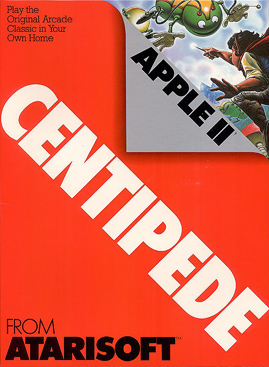
Atarisoft was a brand name used by Atari, Inc. in 1983 and 1984 to publish video games for non-Atari home computers and consoles. Each platform had a specific color for its game packages: video games sold for the Commodore 64 were in green boxes, games for the TI-99/4A in yellow, the IBM PC in blue, and so on.
In the history of video games, the second-generation era refers to computer and video games, video game consoles, and handheld video game consoles available from 1976 to 1992. Notable platforms of the second generation include the Fairchild Channel F, Atari 2600, Intellivision, Odyssey 2, and ColecoVision. The generation began in November 1976 with the release of the Fairchild Channel F. This was followed by the Atari 2600 in 1977, Magnavox Odyssey² in 1978, Intellivision in 1980 and then the Emerson Arcadia 2001, ColecoVision, Atari 5200, and Vectrex, all in 1982. By the end of the era, there were over 15 different consoles. It coincided with, and was partly fuelled by, the golden age of arcade video games. This peak era of popularity and innovation for the medium resulted in many games for second generation home consoles being ports of arcade games. Space Invaders, the first "killer app" arcade game to be ported, was released in 1980 for the Atari 2600, though earlier Atari-published arcade games were ported to the 2600 previously. Coleco packaged Nintendo's Donkey Kong with the ColecoVision when it was released in August 1982.
Tavli, sometimes called Greek backgammon in English, is the most popular way of playing tables games in Greece and Cyprus and is their national board game. Tavli is a compendium game for two players which comprises three different variants played in succession: Portes, Plakoto and Fevga. These are played in a cycle until one player reaches the target score - usually five or seven points.

The Intellivoice Voice Synthesis Module, commonly abbreviated as Intellivoice, is an adapter for the Intellivision, Mattel's home video game console, that utilizes a voice synthesizer to generate audible speech. The Intellivoice is a large, brown cartridge that plugs into the Intellivision's side-mounted cartridge slot; games specifically designed for the device can then be inserted into a slot provided on the right-hand side of the module.

Allergic bronchopulmonary aspergillosis (ABPA) is a condition characterised by an exaggerated response of the immune system to the fungus Aspergillus. It occurs most often in people with asthma or cystic fibrosis. Aspergillus spores are ubiquitous in soil and are commonly found in the sputum of healthy individuals. A. fumigatus is responsible for a spectrum of lung diseases known as aspergilloses.
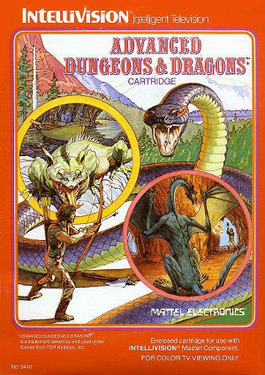
Advanced Dungeons & Dragons is an Intellivision game and was one of the first Advanced Dungeons & Dragons games to be licensed by TSR, Inc. It was later retitled to Advanced Dungeons & Dragons: Cloudy Mountain to distinguish it from the sequel, Advanced Dungeons & Dragons: Treasure of Tarmin. It is the first Intellivision cartridge to use more than 4K of ROM.
PlayCable was an online service introduced in 1980 that allowed local cable television system operators to send games for the Intellivision over cable wires alongside normal television signals. Through the service, subscribers would use a device, called the PlayCable adapter, to download the games for play on their Intellivision. It was the first service that allowed users to download games for play on a video game console. PlayCable was not widely adopted, due in part to high costs for users and operators, as well as limitations of the PlayCable adapter. The service was discontinued in 1984.

Skiing is a sports video game produced by Mattel and released for its Intellivision video game system in 1980. Up to six players compete individually on either a downhill or slalom course to see who can complete the course the fastest. For the game's initial release, Mattel obtained a license from the U. S. Ski Team and used its name and logo in the game's box art. In 1988, INTV Corporation released an enhanced version of the game entitled Mountain Madness: Super Pro Skiing.

M Network was a video game division of Mattel that, in the 1980s, produced games in cartridge format for the Atari 2600 video game system.

The Intellivision Amico is a home video game console that is being developed and marketed by Intellivision Entertainment. It was originally slated to be released in October 2020, but repeated delays followed, leaving the console without a release date.
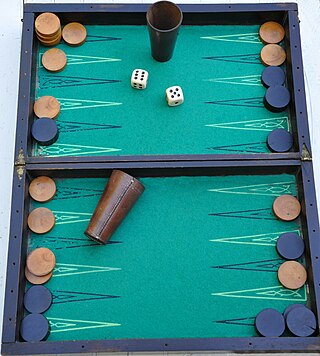
The following is a glossary of terms used in tables games, essentially games played on a Backgammon-type board. Terms in this glossary should not be game-specific, but applicable to a range of tables games.

The World Backgammon Federation (WBGF), formerly the European Backgammon Federation (EUBGF) until 2018, is the international body established to support and promote the tables game of backgammon worldwide.
















